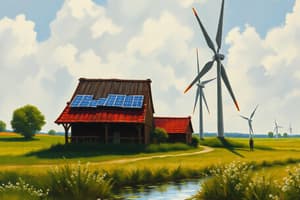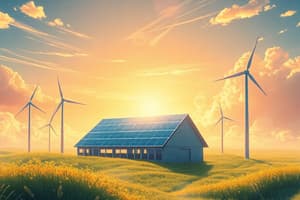Podcast
Questions and Answers
What is a primary advantage of biomass energy?
What is a primary advantage of biomass energy?
- It is the most efficient energy source available.
- It can be produced from fossil fuels.
- It has a high energy density.
- It has a carbon footprint of zero. (correct)
Which is a disadvantage of using fossil fuels?
Which is a disadvantage of using fossil fuels?
- They cannot be replenished on human timescales. (correct)
- They produce zero greenhouse gas emissions.
- They are inexpensive to extract.
- They are highly renewable.
What method is NOT a way to produce nuclear energy?
What method is NOT a way to produce nuclear energy?
- Radioactive decay
- Fusion
- Combustion (correct)
- Fission
Which of the following best describes a significant disadvantage of nuclear energy?
Which of the following best describes a significant disadvantage of nuclear energy?
Which energy source has a lower net carbon dioxide emission compared to coal and gas?
Which energy source has a lower net carbon dioxide emission compared to coal and gas?
What is a common drawback of biomass energy production?
What is a common drawback of biomass energy production?
Which characteristic distinguishes non-renewable energy sources from renewable sources?
Which characteristic distinguishes non-renewable energy sources from renewable sources?
What advantage does nuclear power have over coal?
What advantage does nuclear power have over coal?
What is a key characteristic of renewable energy resources?
What is a key characteristic of renewable energy resources?
Which energy resource relies on converting sunlight into electricity?
Which energy resource relies on converting sunlight into electricity?
What disadvantage is common across many renewable energy sources?
What disadvantage is common across many renewable energy sources?
What is a major advantage of hydroelectric energy?
What is a major advantage of hydroelectric energy?
What is a significant disadvantage of geothermal energy?
What is a significant disadvantage of geothermal energy?
How does wind energy generate electricity?
How does wind energy generate electricity?
Which renewable energy source can impact local wildlife populations?
Which renewable energy source can impact local wildlife populations?
What is a common feature of renewable energy sources?
What is a common feature of renewable energy sources?
Flashcards
Biomass Energy
Biomass Energy
Energy from plants, crops, or waste, that can be regrown.
Biomass Carbon Footprint
Biomass Carbon Footprint
Zero or lower net carbon dioxide emissions than fossil fuels.
Fossil Fuels
Fossil Fuels
Energy source from ancient plants and animals.
Fossil Fuel Energy Density
Fossil Fuel Energy Density
Signup and view all the flashcards
Nuclear Fission
Nuclear Fission
Signup and view all the flashcards
Nuclear Fusion
Nuclear Fusion
Signup and view all the flashcards
Nuclear Energy Carbon Footprint
Nuclear Energy Carbon Footprint
Signup and view all the flashcards
Non-Renewable Energy
Non-Renewable Energy
Signup and view all the flashcards
Renewable Energy
Renewable Energy
Signup and view all the flashcards
Solar Energy
Solar Energy
Signup and view all the flashcards
Wind Energy
Wind Energy
Signup and view all the flashcards
Hydroelectric Energy
Hydroelectric Energy
Signup and view all the flashcards
Geothermal Energy
Geothermal Energy
Signup and view all the flashcards
Energy Resource
Energy Resource
Signup and view all the flashcards
Energy Resource Types
Energy Resource Types
Signup and view all the flashcards
Study Notes
Energy Resources
- Energy resources are materials or elements used to produce energy, such as heat, electricity, or mechanical energy.
- These sources are categorized as renewable or non-renewable.
Renewable Energy
- Renewable energy comes from naturally replenishing sources like the sun, wind, and water.
- These resources are sustainable and do not deplete over time, unlike fossil fuels.
- They are environmentally friendly, reducing pollution and greenhouse gas emissions.
Solar Energy
- Description: Solar energy converts sunlight into electricity using photovoltaic cells in solar panels.
- Advantages: Abundant, environmentally friendly, low maintenance after installation.
- Disadvantages: High installation costs, energy production depends on weather and daylight.
Wind Energy
- Description: Wind energy converts the kinetic energy of moving air into electricity using wind turbines.
- Advantages: Sustainable, cost-effective in windy areas, produces no direct emissions.
- Disadvantages: Turbines can be noisy, require specific locations, and may impact bird and bat populations.
Hydroelectric Energy
- Description: Hydroelectric power uses flowing or falling water, often through dams, to generate electricity.
- Advantages: Reliable and renewable energy source, helps with water storage and irrigation.
- Disadvantages: Expensive to build dams, can displace communities, and disrupt aquatic ecosystems.
Geothermal Energy
- Description: Geothermal energy is heat energy from the Earth, coming from reservoirs of hot water or steam below the Earth's surface.
- Advantages: Renewable source of energy from the Earth's mantle.
- Disadvantages: High upfront costs; a 1 megawatt capacity plant costs approximately $2-$7 million.
Biomass Energy
- Description: Biomass is a renewable energy source derived from plants or algae.
- Advantages: Zero carbon footprint, releases lower net carbon dioxide emissions than coal or gas.
- Disadvantages: Expensive to gather, transport and store; large-scale electricity production requires considerable land.
Non-Renewable Energy
- Non-renewable energy sources are finite and will eventually run out.
- Most non-renewable energy sources are fossil fuels: coal, petroleum, and natural gas.
- Carbon is the main element in fossil fuels.
Fossil Fuels
- Description: Fossil fuels come from the remains of plants and animals that died millions of years ago.
- Advantages: High energy density, efficient for power generation.
- Disadvantages: Cannot be replenished on human timescales, depleting over time; burning fossil fuels releases carbon dioxide and other greenhouse gases, contributing to climate change.
Nuclear Energy
- Description: Nuclear energy releases energy from the nucleus of atoms. Two types: fission or fusion.
- Advantages: Low carbon footprint, reliable.
- Disadvantages: Risk of nuclear accidents; radioactive waste is harmful to humans and takes thousands of years to safely dispose of.
Studying That Suits You
Use AI to generate personalized quizzes and flashcards to suit your learning preferences.




